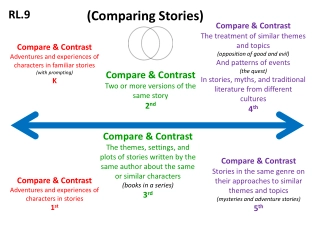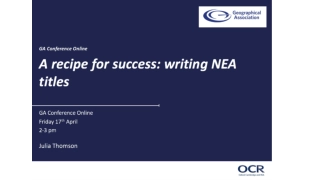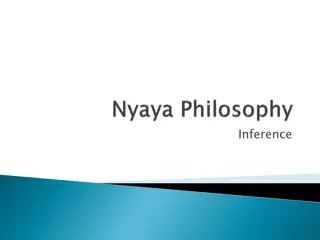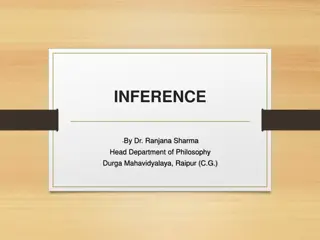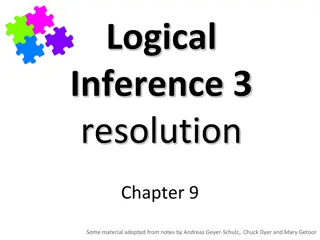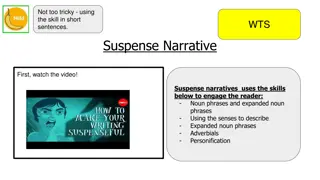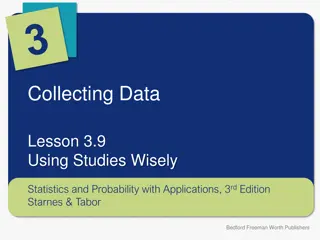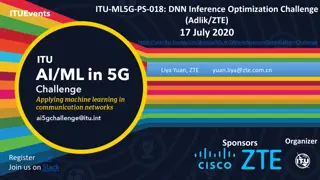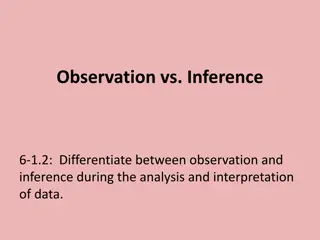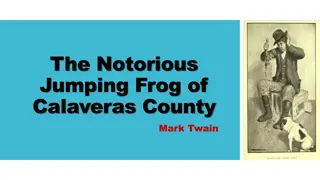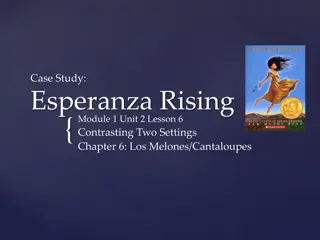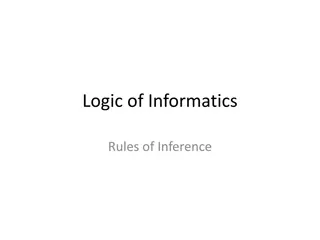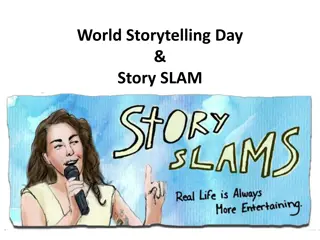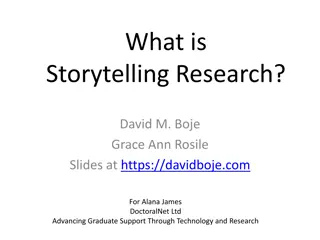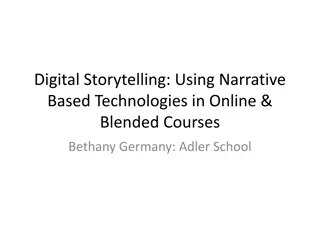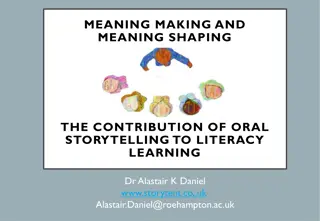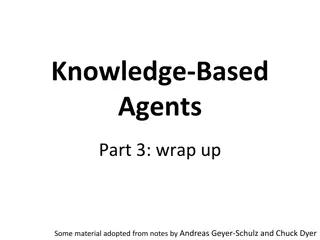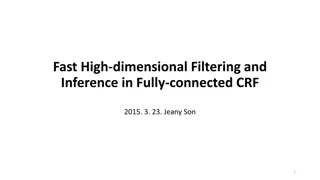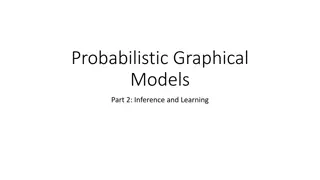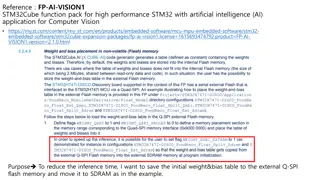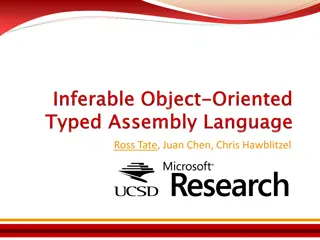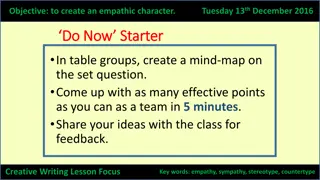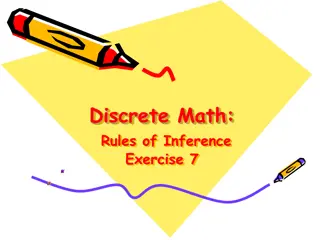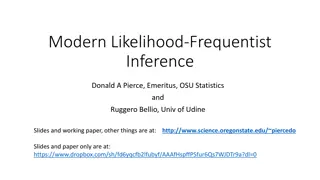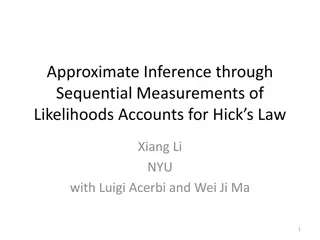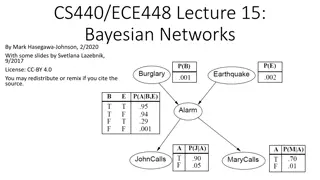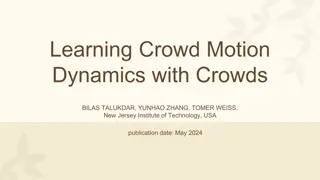Comparative Analysis of Stories Across Cultures
Explore the comparative analysis of stories by comparing themes, settings, and characters across different cultures and authors. Dive into various adventures and experiences of characters in familiar and traditional stories. Understand the treatment of similar themes and topics like good versus evil
2 views • 8 slides
Enhancing Success in Writing NEA Titles: Key Ingredients and Methodologies
Understanding the potential issues with student titles and identifying the key ingredients for successful outcomes in writing NEA titles is crucial. The recipe for success lies in clear project scope, strong core concepts, well-planned methodologies, and effective data collection. Avoiding common pi
2 views • 24 slides
Understanding Inference and Vyapti in Logic
Inference, known as Anumana in Sanskrit, is the process of deriving knowledge based on existing information or observations. It can be used for personal understanding or to demonstrate truths to others. An inference may be SvArtha (for oneself) or ParArtha (for others). Vyapti, the invariable concom
1 views • 14 slides
Understanding Inference in Indian Philosophy
In Indian philosophy, inference is considered one of the six ways to attain true knowledge. It involves three constituents: Hetu (middle term), Sadhya (major term), and Paksha (minor term). The steps of inference include apprehension of the middle term, recollection of the relation between middle an
11 views • 8 slides
Understanding Resolution in Logical Inference
Resolution is a crucial inference procedure in first-order logic, allowing for sound and complete reasoning in handling propositional logic, common normal forms for knowledge bases, resolution in first-order logic, proof trees, and refutation. Key concepts include deriving resolvents, detecting cont
2 views • 12 slides
Crafting Suspenseful Narratives: Techniques and Examples
Experience the art of crafting suspenseful narratives through noun phrases, senses descriptions, personification, and more. Dive into examples like the eerie tale of Sarah facing the unknown in a mysterious hole. Unleash your creativity to engage readers and keep them on the edge of their seats. Enh
0 views • 10 slides
Understanding the Scope of Inference in Statistical Studies
Statistical studies require careful consideration of the scope of inference to draw valid conclusions. Researchers need to determine if the study design allows generalization to the population or establishes cause and effect relationships. For example, a study on the effects of cartoons on children'
1 views • 15 slides
Analyzing Characters and Themes in "Demon Dentist Lesson 7-21-1-2021
Explore contrasting characters Mr. Grey and Miss Root in the chapters "Whiter Than White" and "Blacker Than Black". Analyze the impact of their descriptions, infer from chapter titles, and delve into the tense interactions led by Miss Root, the enigmatic dentist. Uncover the author's craft in buildi
1 views • 9 slides
DNN Inference Optimization Challenge Overview
The DNN Inference Optimization Challenge, organized by Liya Yuan from ZTE, focuses on optimizing deep neural network (DNN) models for efficient inference on-device, at the edge, and in the cloud. The challenge addresses the need for high accuracy while minimizing data center consumption and inferenc
0 views • 13 slides
Introduction to Isixhosa Language and Literature - Exploring Characters and Themes
This content provides an overview of Isixhosa as a first additional language (FAL) and delves into key aspects of literature such as character development and themes. It discusses the importance of characters in storytelling, emphasizing the significance of round and flat characters. The article als
3 views • 28 slides
Understanding the Difference Between Observation and Inference
Learn to differentiate between observation (direct facts or occurrences) and inference (interpretations based on existing knowledge or experience) through examples such as the Sun producing heat and light (observation) and a dry, itchy skin leading to the inference that it is dry. The distinction be
2 views • 14 slides
Exploring North American Tall Tales and Humorous Storytelling
The Notorious Jumping Frog of Calaveras County by Mark Twain and The Scarlet Letter by Nathaniel Hawthorne are examples of distinctly North American storytelling forms known as tall tales. These tales feature exaggerated characters and events, utilizing hyperbole, understatement, and local color to
0 views • 16 slides
Navigating Statistical Inference Challenges in Small Samples
In small samples, understanding the sampling distribution of estimators is crucial for valid inference, even when assumptions are violated. This involves careful consideration of normality assumptions, handling non-linear hypotheses, and computing standard errors for various statistics. As demonstra
0 views • 19 slides
Contrasting Settings in Esperanza Rising
In this lesson, students explore contrasting settings in the novel "Esperanza Rising" by analyzing Chapter 6, Los Melones/Cantaloupes. They learn about the term campesino, compare California to Mexico, and delve into text-dependent questions, examining the significance of words like "wilted" in desc
0 views • 10 slides
Understanding Rules of Inference in Logic
Dive into the world of logic with this detailed exploration of rules of inference. Learn about different types of arguments, such as Modus Ponens and Modus Tollens, and understand how to determine the validity of an argument. Discover the purpose of rules of inference and unravel the logic behind co
0 views • 17 slides
Character Archetypes and Their Role in Storytelling
Explore the classic character archetypes such as the hero, villain, everyman, innocent, and Christ figure in storytelling. These archetypes symbolize universal patterns of human nature and play essential roles in narratives by representing moral conflicts, challenges, and sacrifices. Discover how th
0 views • 11 slides
Capitalization Rules in APA Style for Titles of Works
Understanding the principles of capitalizing titles according to APA style is crucial for proper academic writing. In APA format, titles of books, articles, and sections within articles have specific capitalization rules. Major words such as verbs, nouns, adjectives, adverbs, and pronouns are capita
0 views • 19 slides
Unveiling Archetypes in "The Outsiders" Mid-Book Review
Embedded within "The Outsiders" mid-book review are insights into the characters, settings, and symbolism of different chapters. The narrative delves into archetypes, shedding light on their significance in shaping familiar character types and traditions in storytelling. These archetypes, such as Th
0 views • 32 slides
Celebrate World Storytelling Day with StorySLAM
Celebrate the art of storytelling on World Storytelling Day through StorySLAM, a live storytelling competition where participants share true stories within a time limit. Explore tips on delivering engaging stories and participate in this global event held on the Spring equinox. Engage in the excitem
0 views • 11 slides
Understanding Expert Systems and Knowledge Inference
Expert Systems (ES) act as synthetic experts in specialized domains, emulating human expertise for decision-making. They can aid users in safety, training, or decision support roles. Inference rules and knowledge rules play key roles in ES, helping in problem-solving by storing facts and guiding act
0 views • 63 slides
Unveiling the Power of Storytelling in Biblical Narratives
Exploring the profound impact of storytelling in Biblical narratives, drawing parallels to universal themes found in fairy tales and examining the structure of the Bible through a storytelling lens. Reflecting on the significance of passing on meaning, creating identities, and fostering a sense of b
0 views • 19 slides
Understanding Storytelling Research: An Overview
Storytelling research delves into narratives, counternarratives, living stories grounded in time and place, and antenarrative processes. It explores the concepts of storytelling as Tamara-Land, antenarrative, and a science. The intersubjectivity of storytelling unfolds through untold stories and con
0 views • 25 slides
Exploring Digital Storytelling in Online and Blended Courses
Uncover the world of digital storytelling, where narratives come to life through various media forms. Discover how educators can incorporate digital storytelling to enhance student engagement and learning outcomes. Explore the rich history of storytelling and its significance in education, along wit
0 views • 12 slides
Understanding the Role of Oral Storytelling in Literacy Learning
Oral storytelling plays a crucial role in literacy learning by allowing individuals to construct meaning through narratives. Dr. Alastair K. Daniel explores the significance of storytelling and its impact on interpreting events and ideas, emphasizing the blend of orality and literacy in education. K
0 views • 40 slides
Understanding Knowledge-Based Agents: Inference, Soundness, and Completeness
Inference, soundness, and completeness are crucial concepts in knowledge-based agents. First-order logic allows for expressive statements and has sound and complete inference procedures. Soundness ensures derived sentences are true, while completeness guarantees all entailed sentences are derived. A
0 views • 6 slides
Fast High-Dimensional Filtering and Inference in Fully-Connected CRF
This work discusses fast high-dimensional filtering techniques in Fully-Connected Conditional Random Fields (CRF) through methods like Gaussian filtering, bilateral filtering, and the use of permutohedral lattice. It explores efficient inference in CRFs with Gaussian edge potentials and accelerated
0 views • 25 slides
Correct Comma Usage with Degrees, Titles, and Names
Learn how to properly use commas to separate initials, degrees, and titles from names in sentences. Understand when to use commas with titles that are parenthetical and when they are not needed when titles precede names. Explore the usage of commas with "Jr." in different contexts. Practice correct
0 views • 7 slides
Comparative Analysis of Academic Job Titles in Higher Education Institutions
This document provides an in-depth comparison of academic job titles in various higher education systems, focusing on Swedish and British universities. It discusses the nuances and equivalencies of titles such as professor, lecturer, research fellow, and more, highlighting differences and similariti
0 views • 9 slides
Probabilistic Graphical Models Part 2: Inference and Learning
This segment delves into various types of inferences in probabilistic graphical models, including marginal inference, posterior inference, and maximum a posteriori inference. It also covers methods like variable elimination, belief propagation, and junction tree for exact inference, along with appro
0 views • 33 slides
Optimizing Inference Time by Utilizing External Memory on STM32Cube for AI Applications
The user is exploring ways to reduce inference time by storing initial weight and bias tables in external Q-SPI flash memory and transferring them to SDRAM for AI applications on STM32Cube. They have questions regarding the performance differences between internal flash memory and external memory, r
0 views • 4 slides
Typed Assembly Language and Type Inference in Program Compilation
The provided content discusses the significance of typed assembly languages, certifying compilers, and the role of type inference in program compilation. It emphasizes the importance of preserving type information for memory safety and vulnerability prevention. The effectiveness of type inference me
0 views • 17 slides
Exploring Empathy Through Character Creation in Creative Writing
Delve into the realm of empathy through the art of crafting characters in creative writing. Uncover the nuances of empathy, sympathy, stereotypes, and counter types as you develop engaging and relatable characters. Understand the impact of empathy on storytelling and character perception, as well as
0 views • 30 slides
Enhancing Literature Analysis Skills Through Inference and Deduction
Explore a lesson plan focused on developing inference and deduction skills in literature analysis. Students will engage with texts, answer differentiated questions, and work collaboratively to analyze themes, characters, language, and structural features. The lesson includes practice in selecting qu
0 views • 17 slides
Rules of Inference Exercise Solutions in Discrete Math
This content provides solutions to exercises involving rules of inference in discrete mathematics. The solutions explain how conclusions are drawn from given premises using specific inference rules. Examples include identifying whether someone is clever or lucky based on given statements and determi
0 views • 4 slides
Modern Likelihood-Frequentist Inference: A Brief Overview
The presentation by Donald A. Pierce and Ruggero Bellio delves into Modern Likelihood-Frequentist Inference, discussing its significance as an advancement in statistical theory and methods. They highlight the shift towards likelihood and sufficiency, complementing Neyman-Pearson theory. The talk cov
0 views • 22 slides
Evolution of Thriller Genre: From Crime Retribution to Psychological Imbalance
The history of the thriller genre traces back to the 17th century with themes of crime retribution evolving into entertainment by the 19th century. Crime was viewed as a social problem in the late 20th century, leading to the emergence of detective and criminal noir styles. Psycho thriller narrative
0 views • 6 slides
Exploring Story Characters with Speech Bubbles Activity
Dive into the world of storytelling by exploring different characters in a tale. Engage in a creative exercise where you imagine what characters might say and do. Enhance literacy skills by writing speech bubbles for characters in the story, focusing on spelling, letter formation, and punctuation. L
0 views • 6 slides
Sequential Approximate Inference with Limited Resolution Measurements
Delve into the world of sequential approximate inference through sequential measurements of likelihoods, accounting for Hick's Law. Explore optimal inference strategies implemented by Bayes rule and tackle the challenges of limited resolution measurements. Discover the central question of refining a
0 views • 29 slides
Understanding Bayesian Networks for Efficient Probabilistic Inference
Bayesian networks, also known as graphical models, provide a compact and efficient way to represent complex joint probability distributions involving hidden variables. By depicting conditional independence relationships between random variables in a graph, Bayesian networks facilitate Bayesian infer
0 views • 33 slides
Dynamic Crowd Simulation Using Deep Reinforcement Learning and Bayesian Inference
This paper introduces a novel method for simulating crowd movements by combining deep reinforcement learning (DRL) with Bayesian inference. By leveraging neural networks to capture complex crowd behaviors, the proposed approach incorporates rewards for natural movements and a position-based dynamics
0 views • 15 slides
